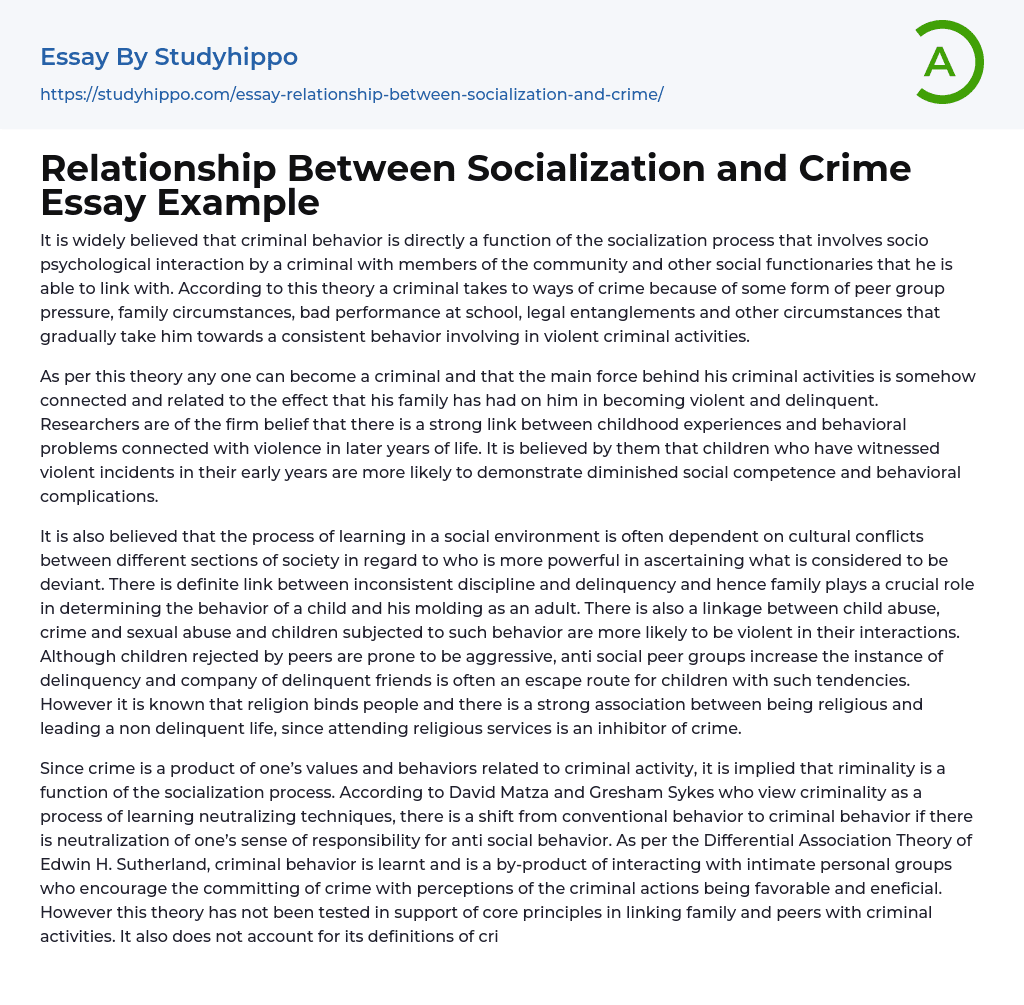It is widely believed that criminal behavior is directly a function of the socialization process that involves socio psychological interaction by a criminal with members of the community and other social functionaries that he is able to link with. According to this theory a criminal takes to ways of crime because of some form of peer group pressure, family circumstances, bad performance at school, legal entanglements and other circumstances that gradually take him towards a consistent behavior involving in violent criminal activities.
As per this theory any one can become a criminal and that the main force behind his criminal activities is somehow connected and related to the effect that his family has had on him in becoming violent and delinquent. Researchers are of the firm belief that there is a strong link between childhood experiences and behavior
...al problems connected with violence in later years of life. It is believed by them that children who have witnessed violent incidents in their early years are more likely to demonstrate diminished social competence and behavioral complications.
It is also believed that the process of learning in a social environment is often dependent on cultural conflicts between different sections of society in regard to who is more powerful in ascertaining what is considered to be deviant. There is definite link between inconsistent discipline and delinquency and hence family plays a crucial role in determining the behavior of a child and his molding as an adult. There is also a linkage between child abuse, crime and sexual abuse and children subjected to such behavior are more likely to be violent in their interactions. Although children rejected by peers are prone to
be aggressive, anti social peer groups increase the instance of delinquency and company of delinquent friends is often an escape route for children with such tendencies. However it is known that religion binds people and there is a strong association between being religious and leading a non delinquent life, since attending religious services is an inhibitor of crime.
Since crime is a product of one’s values and behaviors related to criminal activity, it is implied that riminality is a function of the socialization process. According to David Matza and Gresham Sykes who view criminality as a process of learning neutralizing techniques, there is a shift from conventional behavior to criminal behavior if there is neutralization of one’s sense of responsibility for anti social behavior. As per the Differential Association Theory of Edwin H. Sutherland, criminal behavior is learnt and is a by-product of interacting with intimate personal groups who encourage the committing of crime with perceptions of the criminal actions being favorable and eneficial. However this theory has not been tested in support of core principles in linking family and peers with criminal activities. It also does not account for its definitions of crime and assumes delinquency and crime to be rational.
The Labeling Theory accounts for criminal behavior due to destructive social interactions whereby people are labeled to define them with negative labels that stigmatize a person and reduce his self-image thus encouraging criminal behavior by him. Labeling theory is not onsidered to be very valid due to its inability to define the circumstances that must exist before a person is labeled and its failure to account for the difference in crime rates at different times
and at different places. 3 The Social Control Theory proposes that people tend to remain law abiding and don’t break the law due to inherent values, beliefs, relationships and commitments and thus there is a strong case for such moral codes to be developed within the community.
Believers of this theory propagate the possibility of internalizing such traits in individuals o discourage them from delinquent acts and thus prevent the likelihood of criminal tendencies developing in young adults. Most of the conclusions of this theory have been found to be very convincing in concluding that individuals will not engage in criminal and anti social activities if they are made to realize that such acts will reduce their freedom and means of earning a respectable and satisfied life in the event of their being convicted and put into prison. Hence, the efforts are made to rehabilitate delinquents to reduce the incidence of anti social and criminal activities.
- Appreciation essays
- Animal Cruelty essays
- Charles Manson essays
- Crime Prevention essays
- Crime scene essays
- Criminal Justice essays
- Criminology essays
- Cyber Crime essays
- Damages essays
- Detention essays
- Distracted Driving essays
- Drug Trafficking essays
- Drunk Driving essays
- Forensic Science essays
- Gang essays
- Hate Crime essays
- Homicide essays
- Identity Theft essays
- Juvenile Crime essays
- Juvenile Delinquency essays
- Juvenile Justice System essays
- Law Enforcement essays
- Murder essays
- Organized Crime essays
- Penology essays
- Piracy essays
- Prison essays
- Property Crime essays
- Prostitution essays
- Punishment essays
- Punishments essays
- Rape essays
- Robbery essays
- Serial Killer essays
- Sexual Assault essays
- Sexual Assault on College Campuses essays
- Sexual Harassment essays
- Sexual Offence essays
- Stealing essays
- Surveillance essays
- Ted Bundy essays
- Victim essays
- Violent crime essays
- White Collar Crime essays
- Adoption essays
- Aunt essays
- Babies essays
- Bedroom essays
- Caring essays
- Children essays




